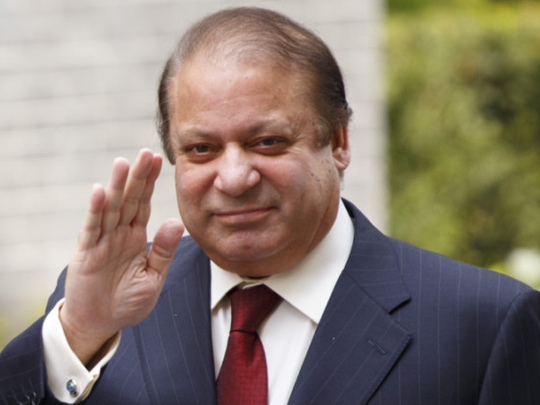
Clashes between Pakistan’s police and followers of Tahirul Qadri, an Islamic preacher, on Friday in parts of the Punjab province, have clearly set the pace for coming events. They have also indicated a growing tendency under the regime of Pakistan’s prime minister Nawaz Sharif to opt for an overkill in dealing with anti-government dissent across the increasingly troubled nuclear-armed south Asian country.
Welcome to the latest turn of events in Pakistan where anti-government protests are set to grow in the coming days, causing added political turbulence at a time when stability is already excessively fragile.
Yesterday, Sharif called for national unity during a gathering of high ranking army officers and prominent politicians, assembled in Islamabad to review progress in an ongoing campaign against Taliban militants. Yet, the mood on the streets remained far too removed from Sharif’s visibly conciliatory spin.
His regime has responded to the growing crisis with a two-fold strategy. On the one hand, the regime appears determined to defy its opponents practically as simply malicious trouble makers.
On the other hand, Sharif’s regime has opted to enforce the law with an iron hand. Rather than critically analyse Qadri’s onslaught from the central city of Lahore and deal with it politically, the provincial regime in the Punjab, of which Lahore is the local capital, has chosen to opt for strong armed tactics. Qadri’s arrest has also been ordered. Ultimately, the fight to the finish will likely be fought and decided in Lahore where Shahbaz Sharif, the prime minister’s younger brother,is chief minister of Punjab.
The emerging events in Pakistan have raised the profoundly significant question if indeed Sharif’s days in power are numbered? The answer to that riddle depends on his ability to overcome the challenge. The past year — Sharif’s first year as prime minister following the 2013 parliamentary elections, has vividly demonstrated the Pakistani prime minister’s failure to tackle the country’s multiple challenges.
Politically, Sharif has remained detached from the country’s mainstream. More often than not, his absence from parliament in Islamabad has demonstrated the Pakistani prime minister’s lack of interest in giving an impetus to a political process that will tackle Pakistan’s many challenges. On Saturday, Sharif’s appearance at the gathering in Islamabad and his conciliatory message was an exception to the way he has remained aloof from Pakistan’s politics.
On other fronts, notably Pakistan’s economic direction, there is a similar story. Sharif has overseen a constant push to create mega projects such as high-profile roads across Pakistan, at a time when the country continues to suffer from an energy crisis. Meanwhile, just below half of Pakistan’s population lives in extreme poverty while there appears to be little attention to the need for embracing a fast paced revamp of essential public services like health care and education. Eventually, it is clear that the government’s largely detached character from the needs of Pakistan’s mainstream will likely contribute to the existing factors that have fuelled hardline militancy.
At least six policemen deployed among a force in Lahore to surround Qadri’s home, were kidnapped by Qadri’s followers yesterday. Images of the six men helplessly surrounded by baton-wielding young activists clearly illustrated the deteriorating scenario in Pakistan.
At a time when Sharif must lead from the front in forging an unprecedented national unity to fight Taliban militants who pose an existential threat to Pakistan, his growing inability to tackle increasingly violent political dissent raises questions over the country’s future.
More vitally, the increasingly hapless state of Pakistan’s police in the face of Qadri’s movement is a powerful reminder of historical precedents where the refusal of law enforcers in different states, has eventually contributed to changing regimes. Perhaps even at this difficult time, Sharif could have recovered a part of his increasingly crippled regime. Yet, the statesmanship of the kind which will be required to pull off such a major recovery, so far seems lacking in the Pakistani prime minister’s character.
In the coming days, Sharif’s next big challenge will come on Thursday when Imran Khan, the cricket star-turned politician, has announced plans to lead a freedom march to Islamabad. The event is appropriately timed to coincide with August 14 – Pakistan’s annual independence day. Khan’s protest began months ago when he claimed widespread fraud in the 2013 parliamentary elections that brought Sharif to power.
Yesterday, Sharif extended an olive branch to Khan, agreeing to discuss ways to satisfy the latter, in the hope of working jointly to preserve and promote Pakistan’s democracy. However, it is a message which appears to have come too late in the day.
Not only has the regime’s strong armed response to recent protests revealed its intention to use tough tactics rather than political reason to tackle angry dissent. It’s a message from Sharif which follows the abject failure of his regime in giving Pakistan a new direction.
Going forward, with or without Sharif’s ruling structure succumbing to the prevailing events, Pakistanis have good reason to ask a pertinent question: Is Pakistan’s present day ruling structure capable of giving a qualitatively new and significantly improved direction to the country? On the face of it, anecdotal evidence suggests that the answer must lie in the non-affirmative.
Farhan Bokhari is a Pakistan-based commentator who writes on political and economic matters.












